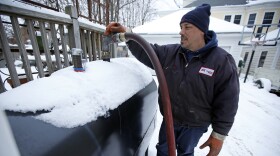-
Operations at Woodland Pulp and St. Croix Chipping mills in Baileyville will wind down Nov. 20. Woodland Pulp spokesperson Scott Beal said about 150 workers will be temporarily laid off as a result.
-
Producers say a wet spring and dry, hot summer cost the industries millions of dollars in lost crops.
-
The new group is focused on lowering construction costs and speeding up the state and municipal permitting process, among other priorities.
-
A Maine Center for Economic Policy analysis says 15,000 workers will see an average increase to their income of nearly $2,100 a year.
-
As the federal government shutdown drags on into a 36th day, the state announced it will use $2.2 million in carryover funds to provide heating assistance benefits to some 4,000 Maine households who signed up for HEAP benefits in August and September.
-
Pre-fabricated and modular housing offer ways to address Maine's affordable housing shortage
-
Under the new policy, developers must provide one unit of income-restricted rental housing for every 19 hotel rooms that are built in Portland, or pay a roughly $9,500 fee into the city's housing trust fund.
-
Two-hour show: Political leaders discuss federal standoff and what it means for Maine; community leaders address statewide impacts
-
Biddeford Mayor Marty Grohman is calling for a special session of the legislature to tap into the budget stabilization fund, also know as the rainy day fund, to pay the 170,000 Mainers expected to lose federal SNAP benefits as of this weekend.
-
The state usually receives LIHEAP funding through the federal government around this time of year. But because the government is shut down, Maine does not have money available to issue regular payments or emergency aid through the Energy Crisis Intervention Program.
-
How to navigate health insurance options in the face of changes and higher premiums—and what to know about open enrollment
-
The Department of Homeland Security announced today it plans to stop issuing automatic work permit extensions for many immigrants who have applied for permit renewals.















